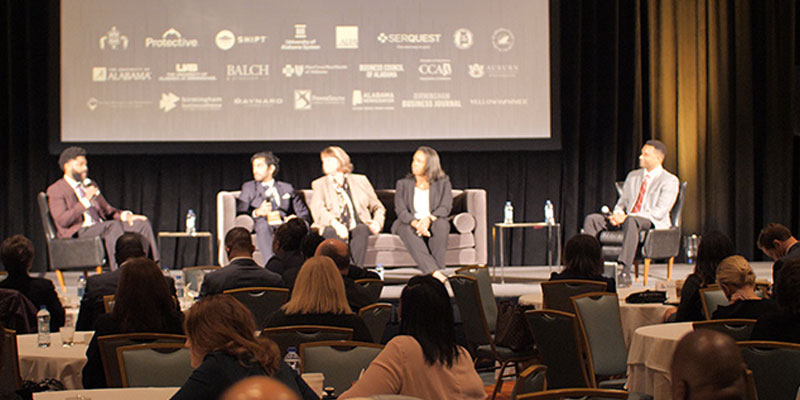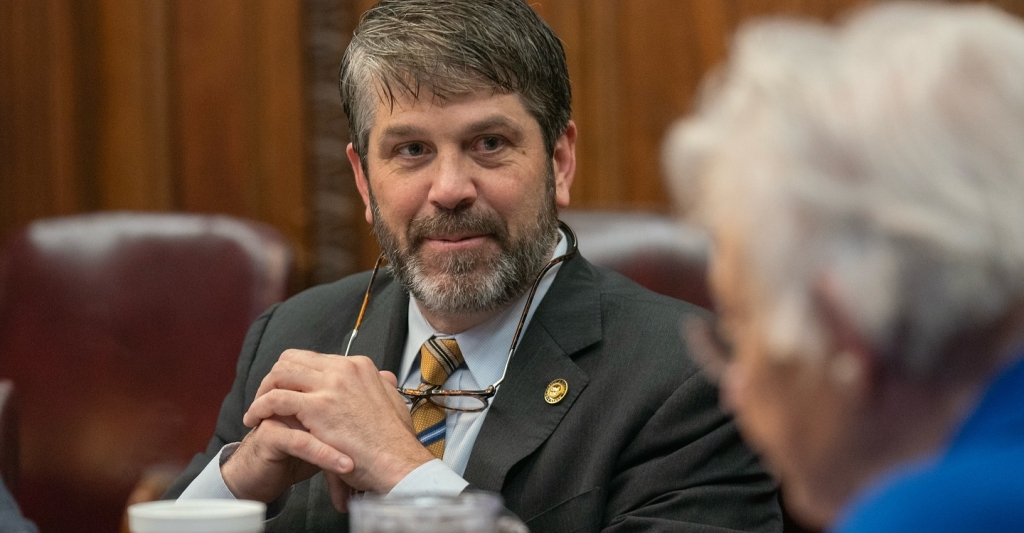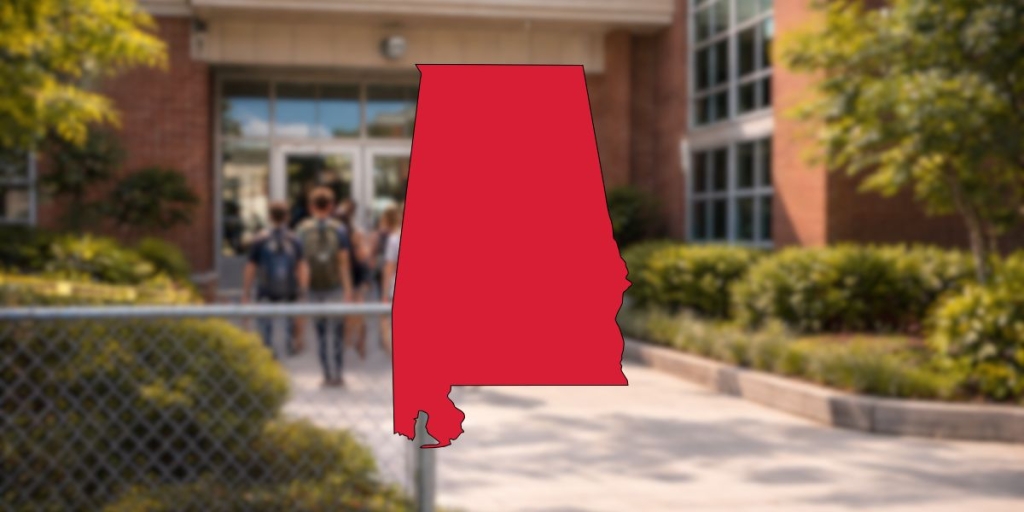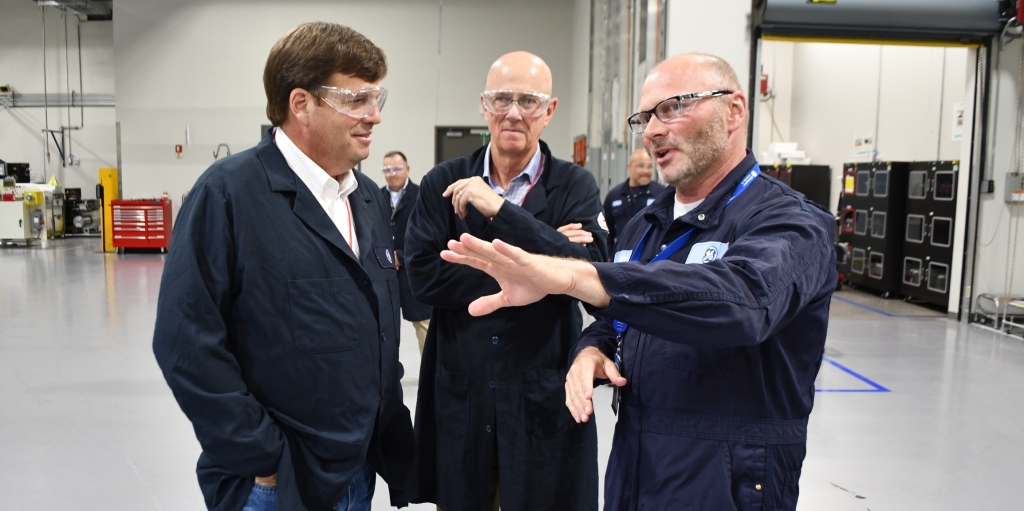Representatives from several Alabama universities discussed their roles in economic development during a panel discussion Oct. 25 at the Alabama Economic Growth Summit in Hoover.
Anthony Hood, director of civic innovation in the Office of the President at UAB, moderated the discussion. He said Alabama’s universities have several ideas — some already implemented, in helping the state resolve its economic growth challenges.
“We are the workforce development engines in our respective communities,” Hood said. “The number one question we get from the startups is, ‘If we come to Birmingham, where am I going to get the people to work for my company?’ Workforce development is a key engine in business recruitment.”
Alabama universities actively growing state’s economy from Alabama NewsCenter on Vimeo.
The panelists discussed a number of obstacles stunting Alabama’s economic growth, including:
- Students and faculty worried a university will claim ownership of their startup idea
- Need for more software developers in Alabama
- Faculty not allowed enough personal time to invest in startup growth
- 4-year college degree requirements on job applications exclude some qualified talent
- Funding for viable startups
LaKami Baker, interim executive director of the Government and Economic Development Institute and professor at Auburn University, said the first step to solving these issues is better policies and funding.
“We need to have policies in place to help those brilliant minds we are educating,” Baker said. “At Auburn, we have a lot of researchers working on things, but at the end of the day, if they don’t have the funding to stay there, they take that talent and their know-how to other states. By having more programs like that, it’s going to help us.”
Theresa Welbourne, executive director of the Alabama Entrepreneurship Institute and professor of entrepreneurship at the University of Alabama, said seed funding, mentoring and access to software developers are the three biggest challenges facing startups in Alabama.
“We can help provide some initial funding, but after that, there’s really a gap,” Welbourne said. “Those companies that have proven themselves, they need from $100,000 to $250,000. That level of capital is really hard for them to come by, and if they don’t get it, they leave. If we start them up and they go, that’s not helping any of us meet our goals.”
Saksham Narang, a licensing associate at UAB, said changing policies to encourage faculty investment in startups and protect a faculty or student’s business idea will encourage more startups to locate and stay in Alabama.
“People think a university is going to take 100% of my company and make me pay all of these milestones and royalties that I just can’t afford to do,” Narang said. “That’s hardly the case. If you are licensing from us, we want a couple of percentage points because we did all of this work — we provided the resources, the validation work, we offered the initial lab space, we filed the patents for you, we just want something for that work.”
Narang also wants universities to give faculty more time to invest in startups, much like faculty are encouraged to do with academic research.
“UAB currently allows for 20 days a year in external activities,” Narang said. “I’ve been advocating that number needs to go up to 52 — one day a week rather than five days a quarter, because in order to keep a company here, they need to be involved, but if they can only be involved for a few hours a week, why should anyone license something and keep it here? There are some policies we need to change, but I will say the university is listening and they are working to implement these changes.”
Hood said businesses should reevaluate their job applications to see if requiring four-year college degrees excludes qualified talent.
“If people can show up on time and do what they are supposed to do, we can train them and build them up, but you may not necessarily need a 4-year degree to do that,” Hood said. “Those are conversations our executive leaders are going to have to have with the HR departments.”
Investing in Alabama
Despite the challenges, the panelists celebrated a growing collaboration among private, public and education officials to grow the state’s economy. Narang pointed to the most recent data from the National Science Foundation, where it ranked Alabama 18th among states for its percentage of investment into research and development versus the state’s GDP.
“We’re making progress but we could be doing a whole lot more,” Narang said. “I’m very proud of what we’re doing and the progress so far.”
Del Smith, executive director for economic development at Alabama A&M University, said his university is finding success through developing relationships.
“We have found ways to connect with the local high schools,” Smith said. “We get both our professors as well as our current students in the local high schools to spark the interests of some of the high school students.”
Baker said Auburn University is encouraging startups and graduates to remain in Alabama through training and competitions.
“For the last five years we’ve been running a business idea competition, which has been the inspiration to create that entrepreneurial mindset, not only at Auburn University but also in the surrounding community,” Baker said. “We’re also making sure we put resources in place to keep them there once they take that business to the next level. That’s been one of the challenges is where students go when they graduate.
Welbourne said business mentors are helping by building bonds with students and faculty.
“Tuscaloosa is a really great community,” Welbourne said. “We don’t have a lot of businesses so we rely on our alums and friends of friends.”
Hood said Alabama’s universities are helping Alabama grow, but more needs to be done.
“We are the workforce engines of our communities, but our organizations are looking for talent,” Hood said. “We need to be able to complement our normal activities around business recruitment and expansion. Having incubators, accelerators and funding sources such as angel investors and venture capitalists to bring money in, to accelerate, to have that rocket fuel for our companies is important, as well as our corporate community giving contracts to our startup companies. We want these companies to stay here and grow.”
(Courtesy Alabama NewsCenter)













